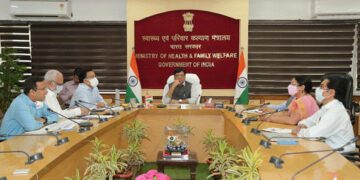By Health In Five Writer
According to the Global Burden of Disease, nearly a quarter (24.8 per cent) of all deaths in India are due to cardiovascular diseases (CVDs). And the risk has been increasing gradually, especially in the younger population. Lately, it has also come to light that the high Waist Hip Ratio (WHR), BP and obesity has turned out to be the leading causes of the increasing rate of CVDs in women.
To bring to the fore the growing evidence of the link between obesity, hypertension and Waist Hip Ratio and CVDs in the Indian population and to educate them about its early detection by preventive screening, India Health Link (IHL) in collaboration with HEAL Foundation has conducted a study on Preventing Heart Diseases in Youth: Growing evidence of a link between Waist Hip Ratio (WHR), BP & BMI and CVDs.
In the study, 1599 respondents participated from residential societies (RWAs) and patients from hospitals. There were 1103 respondents from hospitals, and 496 from residential societies (RWAs). The study had 68 per cent men and 38 per cent women participants. The sample diagnostic test results of the participants were collected from IHL’s Digital Kiosk/Health ATMs. The test parameters included participants’ demographics, gender, age, BMI, BP and Waist Hip Ratio (WHR).
The study has brought out that almost half (48 per cent) of the total population is either hypertensive or at risk, and 30 per cent have a high Waist Hip Ratio (WHR), which shows early indication of the onset of CVDs in due course. However, while comparing men with women, more men (37 per cent) are found to be at higher stress than women (23 per cent). But amongst the hypertensive, 80 per cent of women were obese or overweight compared to 67 per cent of men. Furthermore, a striking 67 per cent of those women had high WHR compared to just 28 per cent of men with high WHR.
While presenting the study revelation on the growing evidence of a link between Waist Hip Ratio (WHR), BP & BMI and CVDs, Dr Satyender Goel, Founder & CEO, India Health Link (IHL) said, “The study has brought out that there is a strong correlation between the increasing Waist Hip Ratio, BMI and BP, and the rising incidence of CVDs in the younger population. But in the study, one striking finding revealed that 80 per cent of hypertensive women are obese, and 67 per cent of them have a high Waist Hip Ratio. And overall, women were found to be more at risk of undiagnosed cardiovascular problems than men.”
“As the respondents of the study were patients from hospitals and people from residential societies (RWAs), a similar high percent prevalence of hypertension and obesity was found between the patients in hospitals and residents in societies. So, what the study infers, is the need for behaviour change and inculcating the habit of regular preventive screening for women and men of all ages, irrespective of their professional status, to bring down the rate of the incidence of CVDs. A sedentary lifestyle has a big impact on the early development of cardiovascular diseases, which tend to go unnoticed until it becomes chronic. Thus, the study reveals that the high WHR with persistent hypertension and obesity are the leading causes of the rising incidence of CVDs and the cases of premature heart attacks in the younger Indian population,” added Dr Goel.
Follow Health In Five on LinkedIn, Facebook, Twitter & Instagram
Subscribe on WhatsApp & Telegram to receive real time updates








































